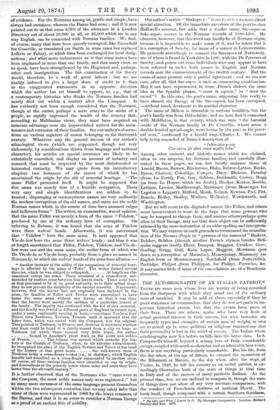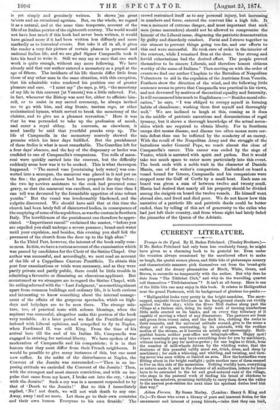THE AUTOBIOGRAPHY OF AN ITALIAN PATRIOT.* MERE are some men
whose lives are worthy of being recorded from the sharpness with which they stand out of the ordinary mass of mankind. It may be said of these, especially if they be great statesmen or commanders, that they do not act parts in im- portant historical events, but that the events form parts of their lives. There are others, again, who have very little of actual personal interest in their careers, but who, however, are frequently types and examples of certain men of weight, or who are so mixed up in some political or religious transactions that their personality is lost in the whirl of events. The Italian whose autobiography now lies before us falls into the latter class. In S. Campanella himself, beyond a strong love of Italy, considerable energy, coupled with much moderation and an admirable bass voice, there is not anything particularly remarkable. But his life, from the day when, at the age of fifteen, he entered the monastery of -the Riformati at Matera, to the day when, after the siege of Venice, in 1849, he left his country as an exiled patriot, is ex- ceedingly illustrative both of the state of things at that time in Italy and of the careers of many patriotic Italian. ,At the present time, too, we are inclined to compare it, though the state of things does not allow of any very accurate comparison, with the conduct of Frenchmen desirous of national liberty. The book itself, though composed with a certain Southern floridness,
By Giuseppe Campanella. Londont Richard.
is yet simply and genuinely written. It shows no great talents and an occasional egotism. But, on the whole, we regard it as a natural, and at the same time temperate, account of the life of an Italian patriot of the eighteenth century. The world would not have lost much if this book had never been written, it would have gained more if it had been written less diffusely and more markedly as to historical events. But take it all in all, it gives the reader a very fair picture of certain phases in personal and national Italian life, and we are glad Signor Campanella took it into his head to write it. Still we may say at once that one such work is quite enough, without any more following. We have already said that our author entered a monastery as a pupil at the age of fifteen. The incidents of his life therein differ little from those of any other man in the same situation, with this exception, that his admirable voice rendered his position one of greater pleasure and ease. "I must say" (he says, p. 68), "the monotony of my life in this convent [at Venosta] was a little relieved. For, in fact, whenever the Bishop was sent for, either to officiate him- self, or to assist - in any sacred ceremony, he always invited me to go with him, and sing lita.nie, tantum ergo, or other ecclesiastical hymns, which served to break the monotony of the cloister, and to give me a pleasant recreation." Here it was that he was persuaded to take up the profession of monk, and enter a royal abbey. In convents, as elsewhere, it need hardly be said that youthful pranks crop up. The life of Campanella in the monastery scarcely showed the promise which his later days fulfilled. But the punishment of these frolics is what is most remarkable. The Guardian left for a four days' absence, and the key of the dispensary or larder was confided to one of Campanella's companions. Ten rolls of maca- roni were quickly carried into the convent, but the difficulty suddenly arose how was it to be cooked. This is what thereupon happened. "The sacred vase [containing holy water] was con- verted into a saucepan, the macaroni was placed in it and put on the fire ; the grated cheese had been prepared the day before ; the two lay novices assistants to the cook had procured some gravy, so that the macaroni was excellent, and in less time than I can tell was devoured by the formidable appetites of nine robust youths." But the vessel was irredeemably blackened, and the culprits discovered. We should have said that at this time the church had been lately full of disinterred bodies, in consequence of the emptying of some of the sepulchres, as was the custom in Southern Italy. The horribleness of the punishment can therefore be appre- ciated. "Impertinent rascal!" exclaimed the master, "before you are expelled you shall undergo a severe penance ; bread-and-water until your expulsion, and besides, this evening you shall lick the pavement of the church from the door up to the high altar."
In the Third Part, however, the interest of the book really com- mences. In this, we have a curious account of the examination which was passed by candidates for the Choir of the Sistine Chapel. Our author was successful, and accordingly, we next read an account of the life of a Cappellano Cantore Pontificio. To obtain this post four examinations or trials were necessary, and as they were partly private and partly public, there could be little trouble in admitting a favourite or dismissing an obnoxious applicant. But accustomed as we strangers are to regard the Sistine Chapel, with its ceiling adorned with the "Last Judgment," as something almost apart from common buildings and ordinary life, it is both curious and interesting to know something about the internal manage- ment of the affairs of the gorgeous spectacles, which on high- days and holydays are to be seen there. The strange mix- ture, too, of practical tests with solemn blessings, when the aspirant was successful, altogether make this portion of the book very readable. At a later period we find the Pontifical singer imbued with Liberal opinions, and 'compelled to fly to Naples, when Ferdinand IL was still King. From the time of his arrival here till the end of his Italian life, Campanella was engaged in striving for national liberty. We have spoken of the moderation of Campanella and his compatriots ; it is in that feature that they most differ from their French neighbours. It would be possible to give many instances of this, but one must now suffice. In the midst of the disturbances at Naples, the Convent of the Jesuits was surrounded :—" Then in an im- posing attitude we encircled the Convent of the Jesuits ! Then, with the strongest and most sincere conviction, and with an im- pulse that came from my heart, I broke out into the cry, 'Away with the Jesuits!' Such a cry was in a moment responded to by that of 'Death to the Jesuits ! ' But to this I immediately replied, 'No! not death, we will not wish death to any one. Away, away ! and no more. Let them go to their own countries and their own homes. Everyone to his own fireside.' The crowd restrained itself as to any persona injury, but increasing in numbers and force, entered the convent like a high tide. It was a moment of extreme danger, and most important that such men (some marauders) should not be allowed to compromise the honour of the Liberal cause, disgracing the patriotic demonstration by guilty and disorderly conduct. Parisi and I strove together to our utmost to prevent things going too far, and our efforts to this end were successful. He took.care of order in the interior of the convent, while I remained firm at the door. Our strong and fervid exhortations had the desired effect. The people proved themselves to be sincere Liberals, and therefore honest citizens worthy of the name of Italians." Then moving on with the order of events we find our author Chaplain to the Battalion of Neapolitan Volunteers to aid in the expulsion of the Austrians from Venetia. Feathers show the direction of the wind, and the following little sentence seems to prove that Campanella was practical in his views, and not devoured by motives of theoretical equality and fraternity. It will recommend himmuch to Englishmen :—" Besides moral edu- cation," he says, "I was obliged to occupy myself in forming habits of cleanliness ; washing them first myself and thoroughly well." We are inclined to laugh at this, coming as it does in the middle of patriotic narrations and denunciations of regal tyranny, but it shows a thorough knowledge of the actual neces- sities which are required to obtain liberty. For in Southern camps dirt means disease, and disease too often means more cer- tain defeat.than can be inflicted by the musketry of an enemy, With the recall of the Neapolitan Army and the struggle of the battalions under General Pepe, we reach almost the close of Campanella's career. This career was ended by the siege of - Venice, which is narrated with spirit and pathos. But it would take too much space to enter more particularly into this event. The book ends; with a noble trait in the character of Daniels Mania, one of the writer's compatriots. Embarked on board a vessel bound for Greece, Campanella and his companions were stopped near the Gulf of Corfu by a small boat. Each man on board was given a sum of between twelve and twenty scudi. Mania had desired that nearly all his property should be divided among the emigres on board the twelve vessels.. He himself went abroad also, and lived and died poor. We do not know how thia narrative of a patriotic life and patriotic deeds could be better ended, than by telling of this act of generosity to the exiles whq had just left their country, and from whose sight had lately faded the pinnacles of the Queen of the Adriatic.































 Previous page
Previous page